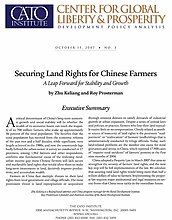A critical determinant of China’s long-term economic growth and social stability will be whether the wealth of its economic boom can reach the majority of its 700 million farmers, who make up approximately 56 percent of the total population. The benefits that the rural population has received from the economic reforms of the past two and a half decades, while significant, were largely achieved in the 1980s, and now the countryside lags badly behind the urban sector. A survey we conducted in 17 provinces, among 1,962 farmers and other respondents, confirms one fundamental cause of the widening rural-urban income gap: most Chinese farmers still lack secure and marketable land rights that would allow them to make long-term investments in land, decisively improve productivity, and accumulate wealth.
Farmers in China face multiple threats to their land rights from local government and village officials. The most prominent threat is land expropriation or acquisition through eminent domain to satisfy demands of industrial growth or urban expansion. Despite a series of central laws and policies, in practice, farmers who lose their land typically receive little or no compensation. Closely related as another source of insecurity of land rights is the persistent “readjustment” or “reallocation” of farmers’ landholdings that is administratively conducted by village officials. Today, such land-related problems are the number one cause for rural grievances and unrest in China, which reported 17,900 cases of “massive rural incidents” of farmers’ protests in the first nine months of 2006.
China adopted a Property Law in March 2007 that aims to strengthen the security of farmers’ land rights, and the next key step will be full implementation of the law. We calculate that securing rural land rights would bring more than half a trillion dollars of value to farmers. Implementing the property law requires major institutional and legal measures on several fronts that China must tackle in the immediate future.
About the Authors

This work is licensed under a Creative Commons Attribution-NonCommercial-ShareAlike 4.0 International License.
